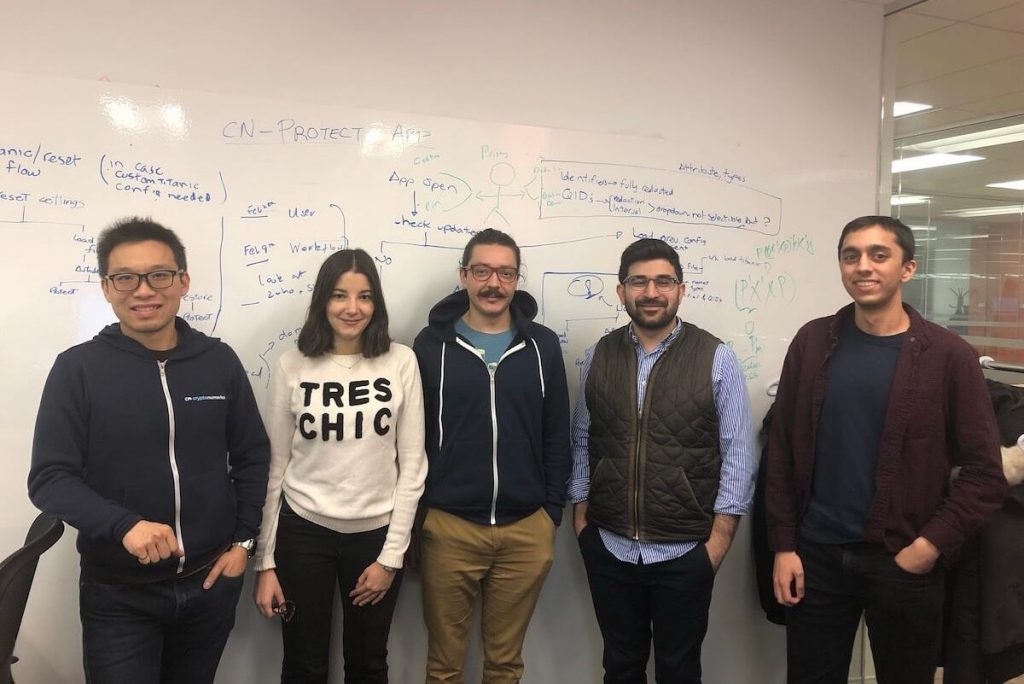A new Toronto-based enterprise software company, CryptoNumerics, announced today that it has raised a $3.3 million CAD seed funding round, and is launching a free, downloadable version of its AI-powered data privacy analytics tool, CN-Protect.
“Consumers expect better and contextual experiences, but they do not want their privacy to be compromised.”
The funding round was led by 11.2 Capital, an early stage VC firm based in San Francisco focused on investing in enterprise software security, virtual and augmented reality, and healthtech. The round also saw participation from fellow California-based VCs, Lux Capital and Silicon Valley Data Capital. As part of the funding 11.2 Capital’s founder and managing partner, Shelley Zhuang, will be joining CryptoNumerics’ board of directors.
CyrptoNumerics was founded in 2018 by a group of five entrepreneurs, with the goal of ensuring that data is useful and relevant to businesses, while also ensuring consumer privacy is not compromised.
In 2017, Monica Holboke, the company’s CEO, came up with the idea when she was involved with Creative Destruction Lab (CDL). She wanted to help protect the quality of businesses’ data and it was at CDL that she met and drew the attention of her four fellow co-founders, who felt she was trying to solve a really important problem.
Along with Holboke, CryptoNumerics lists among its founders, Ash Munshi former CTO at Yahoo, and current fellow at CDL, Jimmy Fan, a former engineer with Nvidia and BlackBerry, Roberto Cervantes, a founder with a background in businesses analytics, as well as Hassan Bhatti, an entrepreneur having founded a number of companies, who also helped to launch CDL’s quantum machine learning incubator.
The group of five began working together early last year and started developing the idea and business through the University of Toronto lab. They incorporated CryptoNumerics in May 2018.
CryptoNumerics was created with the goal of helping enterprises effectively harness data sets, while still complying with privacy regulations such as HIPAA, the GDPR, and the California Consumer Privacy Act (CCPA). The company uses artificial intelligence and machine learning in its two products CN-Protect and CN-Insights, which it states help companies comply with regulations “while maintaining data quality for analytics.” The company’s software is geared towards healthcare organizations, and financial service institutions dealing with large, privacy-sensitive datasets.

“Today there are few things happening in the world, on one side consumers expect better and contextual experiences, but they do not want their privacy to be compromised as businesses try to provide them better products,” Bhatti told BetaKit.
In an increasingly data-driven economy, businesses often rely heavily on data and understanding and analyzing those datasets. With growing concerns over how that data is being used, government’s are putting in place privacy regulations, like the GDPR and CCPA. And while these regulations are in place to do the important work of de-identifying and protecting personal data, CryptoNumerics argues they also restrict a company’s ability to use data effectively.
RELATED: Facebook Live panel argues GDPR changes how tech companies will approach data
Bhatti argued that, in light of regulations, current de-identification techniques are good at protecting data, but end up reducing data utility or data quality to “completely zero.”
“Current approaches to de-identify data such as masking, tokenization, and aggregation can leave data unprotected or without analytical value,” said Holboke a civil engineer and mathematical modeler with a Ph.D. from Dartmouth College. She noted that the CryptoNumerics’ products use the most advanced anonymization techniques, such as optimal k-Anonymity and Differential Privacy, to protect data, while maintaining data utility.
CryptoNumerics’ product comes at a time when data is becoming more important to business operations, alongside growing concerns over privacy. Bhatti emphasized that this is a growing, billion dollar market, and CryptoNumerics is trying to solve one of its biggest problems.
“Data drives AI capabilities and access to data is crucial for companies to succeed.”
“Data drives AI capabilities and access to data is crucial for companies to succeed and stay competitive, especially in regulated industries. But this need for building better AI should not compromise people’s privacy, which is why CryptoNumerics software is so timely,” Zhuang stated.
CN-Insights, which allows companies to build statistical and machine learning models, is already being used by early enterprise customers, including German-based insurance company Munich Re. Today’s announcement makes available a free downloadable version of the company’s second product, CN-Protect, an AI-powered tool that creates privacy protected datasets.
RELATED: Ontario government seeking consultation on new data strategy, with focus on data privacy
Bhatti explained the company’s decision to make the product freely available stemmed from the desire to give data scientists, privacy officers, and legal teams “the ability to easily ensure privacy while preserving the analytical value of data,” as well as to create overall education about its offerings.
“Our biggest focus is how can we move the industry forward, while making sure that people are thinking about privacy.”
CyrptoNumerics is using the seed funding to grow its engineering team, which it has been expanding over the last six months. It plans to continue hiring engineers and focusing on building outs its R&D team. Bhatti noted that if the company wants to win the market it needs to “continue to equip [the] team with more capabilities on the technical side, because it’s a very competitive market.”
The company also plans to use the funding to grow its marketing strategy and sales pipeline as it brings its software to market. The $3.3 million marks the company’s total funding to date.
“Our focus is how can we move the industry forward, while making sure that people are thinking about privacy, not as a second thought, but as front of mind,” Bhatti said. “A lot of people think privacy is an obstacle, which I don’t think that’s the case anymore. It’s something which is really important to do, but that should not be preventing you from achieving your business goals.”
Images courtesy CryptoNumerics


